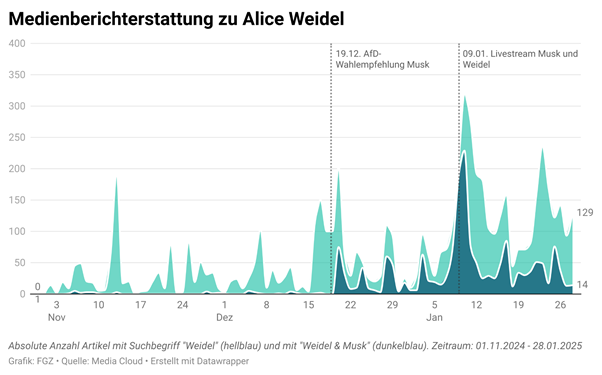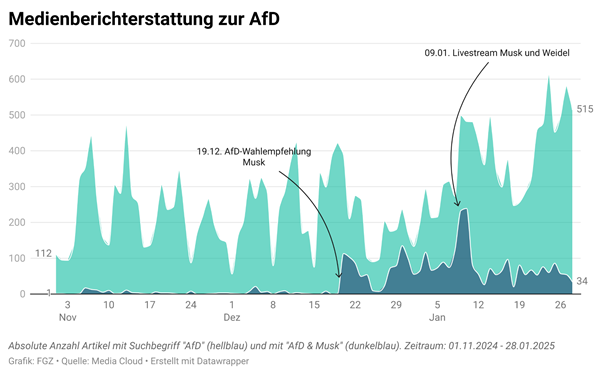“Flood the Zone with Shit” – Elon Musk, the AfD and the Agenda-Setting of the Radical Right in the 2025 German Federal Election
In the current German parliamentary election campaign, the AfD and its top candidate Alice Weidel repeatedly manage to generate a high level of media visibility. This is also decisively linked to the prominent support of US billionaire Elon Musk. The following article explains how Musk’s communicative interventions increase the media presence of Weidel and the AfD and how these dynamics are driven by mechanisms of the digital attention economy.
The article was first published in German on the blog of the Research Institute Social Cohesion (RISC).
Musk Sets the Tone for Public AfD Coverage
“Only the AfD can save Germany,” the American billionaire and advisor to the new Trump administration, Elon Musk, wrote on his short message service “X” in December 2020, in the middle of the German election campaign. Musk had recently attracted attention with radical conspiracy theories, disinformation, insults and, increasingly, communicative interventions in domestic political events in European countries such as Great Britain and Germany. At the end of December, Musk published a guest article in the German newspaper “WELT” [World], followed in January by a live conversation with AfD leader Alice Weidel, which has since been watched by millions of users. The conversation between Weidel and Musk included not only AfD campaign ads, but also numerous half-truths, misinformation and historical revisionist statements (Weidel: “Hitler was a communist”). Celebrity support in the campaign paid off for the frontrunner, for example on platform X, where Weidel’s prominence skyrocketed in time with Musk’s digital interventions (Nenno & Lorenz-Spreen, 2025).
Weidel, Musk and the AfD: X as a Springboard into the Traditional Media Landscape
Similar effects can be observed in the broader German media landscape. The mere announcement of the conversation between Musk and Weidel on X dominated the headlines of major German media outlets:

Online coverage in traditional media: Front pages of BILD, SPIEGEL, taz and DIE ZEIT
A brief quantitative analysis of German-language online media articles using the Media Cloud analysis tool (see methodological notes at the end) confirms that Musk’s interventions contributed to a significant boost in visibility for AfD top candidate Weidel. The share of media articles containing the terms “Weidel” and “Musk” (dark blue) in relation to articles that only mentioned the term “Weidel” (light blue) increased significantly around the election call (December 20: 37%), the WELT article (December 28: 55%) and the X-Talk (January 9: 91%).

The connection became most obvious in the week around the X-talk of Weidel and Musk. On January 9, MediaCloud recorded the highest number of articles with the term Weidel (205 articles) to date, of which 186 also mentioned Musk. Over the week from January 6 to January 12, the number of articles mentioning Weidel skyrocketed to a record 1,243 articles.

If we use the search term “AfD” instead of “Weidel”, it becomes clear that the knock-on effects so far seem to have had a stronger impact on the person and less on the party as a whole, although more moderate effects around the key events are also visible there.
The Digital Attention Economy as the Basis for the Hyper-Salient Communication of the Far Right
The rise of the radical right’s media visibility is based on dynamics that exemplify the transformation of discursive power structures in the digital public sphere. Digital media open up a communicative space of opportunity for actors beyond the traditional political map (such as Musk, AfD, Weidel), in which they can both communicate directly with their supporters without going through the media (inward-looking communication) and substantially influence public discourse (outward-looking communication). The latter is an expression of the current hybrid media system, in which digital and traditional media combine and influence each other. The digital attention economy is particularly fundamental to these mechanisms. Here, political and media actors as well as digital platforms compete for the attention of media consumers in order to communicate their messages and generate advertising revenue. Since the amount of available information in the context of digital media has increased dramatically, but the available human attention has remained the same, competitiveness in the digital attention economy has increased significantly. Even more than before, communicative strategies that make it possible to assert oneself in this environment are becoming increasingly important.
Provocation as a Strategic Tool for Agenda Setting and Hacking
The radical right seems to be more aware of the logic of the digital attention economy than other actors and uses it strategically. For example, Elon Musk’s prominent support of the AfD in the German federal election campaign was a particularly successful form of agenda-setting that significantly increased the media visibility of Weidel and the AfD. Weidel’s historically revisionist statement about Hitler and National Socialism was probably based, among other things, on a strategic interest in further shifting the “boundaries of what can be said” and normalizing extreme right-wing narratives. However, the statement also seems to have been placed as a deliberate provocation, which Weidel could be sure would attract the appropriate media attention and increase her own visibility in the limited attention span of the public arena.
US President Donald Trump has already used the principle of attracting attention through targeted and strategically placed provocations with great success in recent years. Even during the Republican primaries in the run-up to the 2016 presidential election, Donald Trump was able to attract a disproportionate amount of media attention by breaking norms and taboos. This helped him win both the primaries and the presidential election (Schroeder 2018, Wells et al. 2016). Steve Bannon, Trump’s former campaign manager and co-founder of the right-wing extremist portal Breitbart, described the principle of the communicative strategy of the first Trump administration as follows: “Flood the zone with shit”. In this reading, the only decisive factor for evaluating the success of this strategy is media visibility. The truthfulness of one’s own statements and the question of whether public coverage of the statements is more positive or more negative do not play a significant role. This is because the positive reception of statements is ultimately ensured by the (digital) communication channels of the supporting political camp, whose reach is constantly expanded by the strategy described.
Radical Right-Wing (Digital) Noise Pollution: DDoS Attacks on Our Minds
The key to this strategy is to deny the political opposition the opportunity to make an appearance or set its own agenda. Instead, they work on the issues and narratives set by the radical right, as do the media and the press, and rarely set issues of their own. US journalist Julia Angwin describes this strategy of agenda-setting through constant taboo-breaking and provocation as a “DDoS attack on our minds“. DDoS attacks (distributed denial-of-service attacks) are actually a cybersecurity term that describes the overwhelming of a web service (e.g. a website) by a flood of (fake) requests. Applied to the AfD’s strategy and the powerful support of Elon Musk, this form of agenda-setting can be described as a systematic overloading of the political will-forming process. The discourse and information practices on which the formation of political will is based are undermined by constant, often empty and provocative provocations. The functionality of the political decision-making process itself seems fundamentally endangered in the long term.
Debate on How to Deal with the Discourse Strategies of the Radical Right
At this point, it is difficult to say what specific impact the described gains in public discourse will have on the outcome of the 2025 federal elections. The findings of this brief analysis illustrate how quickly public discourse can be hijacked by social media in the slipstream of global political events. And they show how fluid the boundaries between radical digital fringe communities and traditional public discourse spaces can sometimes be.
There is certainly room for political and media action to address these developments. The European Digital Services Act (DSA), like the AI Act adopted in the EU in August 2024, offers a broad scope for intervening. In particular, the broad concept of systematic risks for social debate, electoral processes and public security (Art. 34, 35 DSA) offers leverage points for action against the described dynamics of a digital attention economy. The German Bundestag administration and the EU have announced reviews due to the live talk between Musk and Weidel. DSA proceedings have been underway for some time against some major platform operators. With regard to the public debates in the election campaign, a significant part of the decision-making authority over the nature of the coverage lies with the private media houses and public broadcasters, even though the hybrid media system and the digital attention economy are creating considerable centrifugal forces here. Diverse, comprehensive and informed coverage of the AfD seems necessary, especially in the context of a polarized election campaign. However, a permanent media presence can also have undesirable side effects that benefit the discourse strategies of the far right more than they harm them. In view of the political and media gains of the globalized radical right, there is a need for an ongoing debate in society as a whole about the occasions, extent and form in which the digital barrage of the radical right should be given space.
Methodological Notes
MediaCloud is an open-source analytics platform for online media coverage. The platform collects online media articles provided by the RSS feeds of media websites. Our analysis is based on a collection of 257 media websites from Germany, whose coverage in the period from November 1, 2024 to January 28, 2025 was filtered using the keywords listed above. Not all articles that were indexed by the keywords and included in the graphics above have Musk, Weidel or the AfD as their main topic. However, a random manual validation confirms that the articles essentially cover the media coverage of the aforementioned actors.
Literature
Franck, G. (1998). Ökonomie der Aufmerksamkeit: Ein Entwurf [Economy of Attention: A Draft] (12th edition). Edition Akzente. Carl Hanser Verlag.
Nenno, S. & Lorenz-Spreen, P. (2025). Do Alice Weidel and the AfD benefit from Musk’s attention on X? Alexander von Humboldt Institute for Internet and Society. https://www.hiig.de/en/musk-x-and-the-afd/ https://doi.org/10.5281/ZENODO.14749544
Schroeder, R. (2018). Social Theory after the Internet: Media, Technology, and Globalization. UCL Press. https://doi.org/10.2307/j.ctt20krxdr
Wells, C., Shah, D. V., Pevehouse, J. C., Yang, J., Pelled, A., Boehm, F., Lukito, J., Ghosh, S., & Schmidt, J. L. (2016). How Trump Drove Coverage to the Nomination: Hybrid Media Campaigning. Political Communication, 33(4), 669–676. https://doi.org/10.1080/10584609.2016.1224416
Cover image: iStock, Credit: da-kuk
Last update: 23.02.2025

